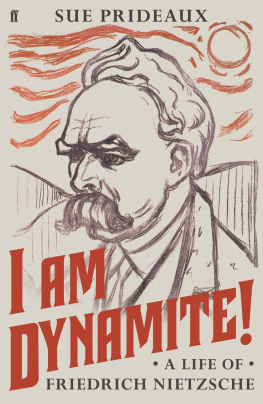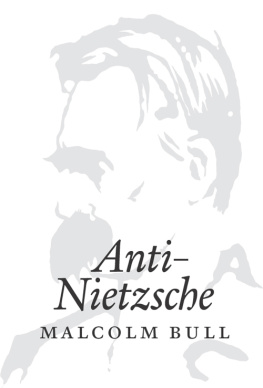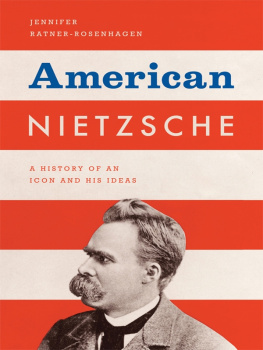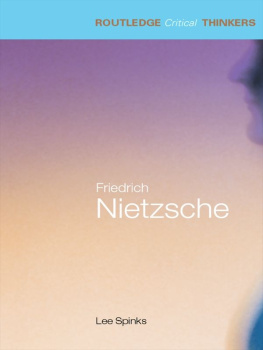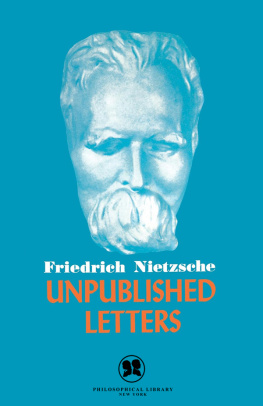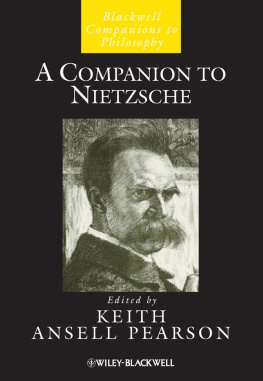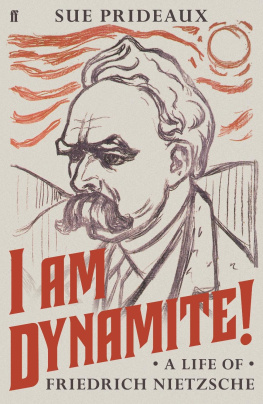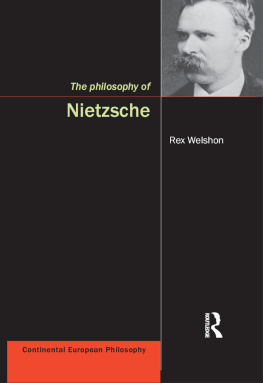Become what you are, having learned what that is.
Many people helped me in different ways through this books four-year journey. I am grateful to those I have met, and those I have not. To the Nietzsche scholars, dead and alive, who have clarified and translated the texts, in some cases clearing away later creative editorship to get back to Nietzsches original, untangling the true from the false in the Nachlass, the literary estate.
Thank you to my editors in the UK and the US, Mitzi Angel and Tim Duggan, for setting off new trains of thought. To Nigel Warburton who has shown immense generosity and swung his hammer to great effect while overseeing the philosophy.
In Switzerland and Germany: Erdmann von Wilamowitz-Moellendorff of the Herzogin Anna Amalia Bibliothek in Weimar, Tanja Fehling of Klassik-stiftung.de, Professor Peter Andr Block and Dr Peter Villwock of the Nietzsche-Haus in Sils-Maria, and Katya Fleischer of the Richard Wagner Museum in Tribschen.
In the UK, thank you Felicity Bryan, Michele Topham and all the team at Felicity Bryan Associates. At Faber, special mentions go to Laura Hassan, Emmie Francis, Donna Payne, Anne Owen, Anna Davidson, John Grindrod and Sophie Portas. Thank you Eleanor Rees for the copy edit and Rachel Thorne for clearing permissions. Thank you Louise Duffett (relative of Harry Kessler) and the Classics Department of Godolphin School in London. Thank you Roger Lomax for casting your eye over the complications of nineteenth-century currencies, and Laura Sanderson for a hilarious session on aphorisms. I am grateful to the team at Andrew Nurnberg and, as always, to the omniscient staff of the London Library.
In the USA, in addition to Tim Duggan, thanks to George Lucas, William Wolfslau, and to Hilary McClellen for fact-checking.
Special thanks to Gillian Malpass, Christopher Sinclair-Stevenson and the late Tom Rosenthal, all of whom gave me courage and support at the very start, to Antony Beevor, Artemis Cooper, Lucy Hughes-Hallett and Sarah Bakewell for useful conversations, and to my family for tact, criticism, research, and tolerating the ghost about the house.
To escape from unbearable pressure you need hashish. Well, then, I need Wagner. Wagner is the antidote to everything German.
Ecce Homo, Why I am so Clever, section 6
On 9 November 1868, the twenty-four-year-old Nietzsche recounted a comedy to Erwin Rohde, his friend and fellow-student at Leipzig University.
The acts, he wrote, in my comedy are headed:
1. An evening meeting of the society, or the sub professor.
2. The Ejected Tailor.
3. A rendezvous with X.
The cast includes a few old women.
On Thursday evening Romundt took me to the theatre, for which my feelings are growing very cool we sat in the gods like enthroned Olympians sitting in judgement on a potboiler called Graf Essex. Naturally I grumbled at my abductor
The first Classical Society lecture of the semester had been arranged for the following evening and I had been very courteously asked if I would take this on. I needed to lay in a stock of academic weapons but soon I had prepared myself, and I had the pleasure to find, on entering the room at Zaspels, a black mass of forty listeners I spoke quite freely, helped only by notes on a slip of paper I think it will be all right, this academic career. When I arrived home I found a note addressed to me, with the few words: If you want to meet Richard Wagner, come at 3.45 p.m. to the Caf Thtre. Windisch.
This surprise put my mind in somewhat of a whirl naturally I ran out to find our honourable friend Windisch, who gave me more information. Wagner was strictly incognito in Leipzig. The Press that intelligent woman whom we both know, had introduced her good friend, Frau Professor Ritschl to her brother. In Frau Ritschls presence, Wagner plays the Meisterlied [Walthers Prize Song from Wagners most recent opera, Die Meistersinger, premiered a few months earlier] and the good woman tells him that this song is already well known to her. [She had already heard it played and sung by Nietzsche, though its musical score had been published only very recently.] Joy and amazement on Wagners part! Announces his supreme will, to meet me incognito; I am to be invited for Sunday evening
During the intervening days my mood was like something in a novel: believe me, the preliminaries to this acquaintance, considering how unapproachable this eccentric man is, verged on the realm of fairy tale. Thinking there were many people to be invited, I decided to dress very smartly, and was glad that my tailor had promised my new evening suit for that very Sunday. It was a terrible day of rain and snow. I shuddered at the thought of going out, and so I was content when Roscher visited me in the afternoon to tell me a few things about the Eleatics [an early Greek philosophical school, probably sixth-century BC ] and about God in philosophy. Eventually the day was darkening, the tailor had not come and it was time for Roscher to leave. I accompanied him so as to continue to visit the tailor in person. There I found his slaves hectically occupied with my suit; they promised to send it in three-quarters of an hour. I left contentedly, dropped in at Kintschys [a Leipzig restaurant much frequented by students] and read Kladderadatsch [a satirical illustrated magazine] and found to my pleasure a notice that Wagner was in Switzerland. All the time I knew that I would see him that same evening. I also knew that he had yesterday received a letter from the little king [Ludwig II of Bavaria] bearing the address: To the great German composer Richard Wagner.
At home I found no tailor. Read in a leisurely fashion the dissertation on the Eudocia, patriarchal wrought-iron gate; it was locked, and so was the front door of the house. I shouted across the garden to the man and told him to come in by the back. It was impossible to make oneself understood through the rain. The whole house was astir. Finally, the gate was opened and a little old man with a package came up to my room. It was six thirty, time to put on my things and get myself ready, for I live rather far out. The man has my things. I try them on; they fit. An ominous moment: he presents the bill. I take it politely; he wants to be paid on receipt of the goods. I am amazed and explain that I will not deal with him, an employee, but only with the tailor himself. The man presses. Time presses. I seize the things and begin to put them on. He seizes the things, stops me from putting them on force from my side; force from his side. Scene: I am fighting in my shirttails, endeavouring to put on my new trousers.
A show of dignity, a solemn threat. Cursing my tailor and his assistant, I swear revenge. Meanwhile he is moving off with my things. End of second Act. I brood on my sofa in my shirttails and consider black velvet, whether it is good enough for Richard.
Outside the rain is pouring down. A quarter to eight. At seven thirty we are to meet in the Caf Thtre. I rush out into the windy, wet night, a little man in black without a dinner jacket.
We enter the very comfortable drawing room of the Brockhauses; nobody is there apart from the family circle, Richard and the two of us. I am introduced to Richard and address him in a few respectful words. He wants to know exact details of how I became familiar with his music, curses all performances of his operas and makes fun of the conductors who call to their orchestras in a bland voice; Gentlemen, make it passionate here. My good fellows, a little more passionate!

